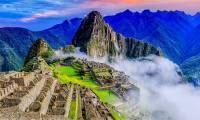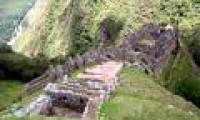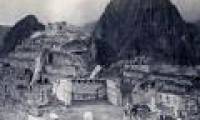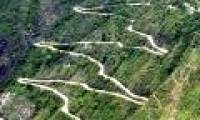
The ancient city of Machu Picchu is a wonderful architectural masterpiece, located on a mountainside at an altitude of more than 2,300m, like a city floating in the clouds.

The Inca Empire was one of the flourishing civilizations in the Americas. During the flourishing period, the Incas considered a leaf more valuable than gold.

The might of the great Inca empire was partly built on a cruel and fearsome terror power, which the four found remains have shown.

The Inca Trail, which leads to the ancient city of Machu Picchu, is a dreamland of adventurers and adventure travelers around the world.

Yesterday, the people of Peru celebrated the 100th anniversary of the adventurers' discovery of the famous ruins of Machu Picchu, a stronghold of the Inca empire.

Unesco's Scientific, Educational and Cultural Organization has recognized Bolivia's Inca Trail together with Argentina, Chile, Colombia, Ecuador and Peru as World Cultural Heritage

Peruvian archaeologists have discovered a mass grave of the ancient Inca civilization in the northern coastal region of Lambayeque.

Thousands of years before anesthesia techniques and accurate medical devices were born, humans performed complicated surgeries.

Archaeologists have unearthed a funeral complex of ancient Ychsma containing mummies buried about 1,000 years ago in Peru.

This extremely sophisticated 'highway' system has turned the Inca empire into one of the most powerful ancient civilizations in the western hemisphere.
 The ancient city of Machu Picchu is a wonderful architectural masterpiece, located on a mountainside at an altitude of more than 2,300m, like a city floating in the clouds.
The ancient city of Machu Picchu is a wonderful architectural masterpiece, located on a mountainside at an altitude of more than 2,300m, like a city floating in the clouds. The Inca Empire was one of the flourishing civilizations in the Americas. During the flourishing period, the Incas considered a leaf more valuable than gold.
The Inca Empire was one of the flourishing civilizations in the Americas. During the flourishing period, the Incas considered a leaf more valuable than gold. The might of the great Inca empire was partly built on a cruel and fearsome terror power, which the four found remains have shown.
The might of the great Inca empire was partly built on a cruel and fearsome terror power, which the four found remains have shown. The Inca Trail, which leads to the ancient city of Machu Picchu, is a dreamland of adventurers and adventure travelers around the world.
The Inca Trail, which leads to the ancient city of Machu Picchu, is a dreamland of adventurers and adventure travelers around the world. Yesterday, the people of Peru celebrated the 100th anniversary of the adventurers' discovery of the famous ruins of Machu Picchu, a stronghold of the Inca empire.
Yesterday, the people of Peru celebrated the 100th anniversary of the adventurers' discovery of the famous ruins of Machu Picchu, a stronghold of the Inca empire. Unesco's Scientific, Educational and Cultural Organization has recognized Bolivia's Inca Trail together with Argentina, Chile, Colombia, Ecuador and Peru as World Cultural Heritage
Unesco's Scientific, Educational and Cultural Organization has recognized Bolivia's Inca Trail together with Argentina, Chile, Colombia, Ecuador and Peru as World Cultural Heritage Peruvian archaeologists have discovered a mass grave of the ancient Inca civilization in the northern coastal region of Lambayeque.
Peruvian archaeologists have discovered a mass grave of the ancient Inca civilization in the northern coastal region of Lambayeque. Thousands of years before anesthesia techniques and accurate medical devices were born, humans performed complicated surgeries.
Thousands of years before anesthesia techniques and accurate medical devices were born, humans performed complicated surgeries. Archaeologists have unearthed a funeral complex of ancient Ychsma containing mummies buried about 1,000 years ago in Peru.
Archaeologists have unearthed a funeral complex of ancient Ychsma containing mummies buried about 1,000 years ago in Peru. This extremely sophisticated 'highway' system has turned the Inca empire into one of the most powerful ancient civilizations in the western hemisphere.
This extremely sophisticated 'highway' system has turned the Inca empire into one of the most powerful ancient civilizations in the western hemisphere.




 Do signals from extraterrestrial civilizations detected by Sky Eye really exist?
Do signals from extraterrestrial civilizations detected by Sky Eye really exist? 'City without air conditioning' in China: People don't know what heat is!
'City without air conditioning' in China: People don't know what heat is! The element of the sun god is giving scientists a headache
The element of the sun god is giving scientists a headache Unique Village: Roofs Become Roads for Residents!
Unique Village: Roofs Become Roads for Residents! Top 7 strange psychological effects of the brain that we all have without knowing
Top 7 strange psychological effects of the brain that we all have without knowing Which is the most terrifying bedroom elixir in Chinese history?
Which is the most terrifying bedroom elixir in Chinese history? Earth's core may start rotating in reverse
Earth's core may start rotating in reverse A day in Japan can be up to 30 hours long, does this country live in a different 'timeline'?
A day in Japan can be up to 30 hours long, does this country live in a different 'timeline'?